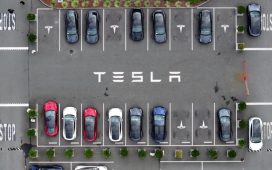“The companies have all tried not to be overtly political,” said Michelle Krebs, executive analyst with Autotrader, a unit of Cox.
Avoiding controversy
Detroit automakers’ penchant for avoiding controversy used to be the standard for corporate America, but they’ve maintained tradition while companies from Nike Inc. to Walmart Inc. have gotten more responsive to hot-button topics, in part to reflect the political views of some customers and employees.
The auto companies say they strive to avoid partisanship and are focused on serving a variety of customers.
”Ford is driven by our values, not by politics,” said Rachel McCleery, a company spokeswoman. GM works across the aisle in Washington and with state and local governments, said company spokesman Jim Cain. “We believe public policy should be driven by data, not politics, and should support a wide range of consumer demands,” Fiat Chrysler said in a statement.
Of the top 15 states for pickup-truck sales, 12 voted for Trump in 2016. Ford’s F-150 — America’s top-selling vehicle of any kind — is the most “red,” deriving more than 74 percent of its sales from states that supported the president, according to the Cox analysis of dealer sales data. GM’s Sierra and Silverado pickups are right behind, at more than 73 percent, with Fiat Chrysler’s Ram at 70 percent.
Cox’s data are for the 12 months ended Sept. 20 and come from its Dealertrack software installed in showrooms across the country for use in credit applications and purchases. It provides Cox with data on about 30 percent of U.S. retail sales, creating a representative sample of the market.
Heavy metal
Pickups are Detroit’s biggest flex, giving the companies bragging rights as purveyors of heavy metal. But even more critical is their role in helping to finance the development of next-generation electric and self-driving cars. Any disturbance in the Detroit 3’s truck dominance would have dire consequences for their long-term plans.
“These trucks are the primary profit drivers that allows them to invest in new technologies like electrification,” said Carla Bailo, president of the Center for Automotive Research in Ann Arbor, Michigan. “That segment is extremely important.”
The Detroit automakers’ relationship with Trump has been tumultuous, as the commander in chief has swung from applauding to assailing them, calling executives “foolish” and their business decisions “stupid.” Auto executives have held their tongues, showing deference to a president with legions of supporters who admire his bare-knuckled style.
“When they get lashed out at, the companies are just being quiet and following through with their product plan, maintaining their customer relations, rather than having a public battle,” Bailo said. “It’s the smartest thing to do.”
Obama issues
Detroit also had issues with former President Barack Obama. After initially rolling out more small and fuel-efficient cars in line with policies during Obama’s first term, many manufacturers ultimately abandoned those vehicles and sought to scale back fuel-economy rules they viewed as too strict amid a boom in demand for large crossovers and SUVs.
Automakers have taken some actions the current president vehemently opposes, such as GM’s decision to close its factory in Lordstown, Ohio, a reliably red state that’s fourth in Cox’s ranking for pickup sales. The president lambasted GM CEO Mary Barra on Twitter, but she held fast to her decision to close the plant, which made slow-selling small cars.
“Trump’s unpredictable and volatile — one day he likes you and then one day he doesn’t,” said David Whiston, auto analyst with Morningstar Inc. in Chicago. “You just can’t plan your company around that volatility. So you just stick to the long-term plan.”
Ford Executive Chairman Bill Ford has managed to maintain cordial relations with the White House despite being among the first auto executives to accept that vehicle emissions contribute to global warming. The carmaker’s alignment with California bucked the administration’s efforts to ease fuel economy regulations and set it apart from GM, FCA and Toyota Motor Corp.
So far, that hasn’t taken a toll on pickup sales: Ford just had its best third quarter for pickup deliveries in 15 years.
“Ford’s not giving up anything by leaning into the new, tougher environmental regulations in California,” said Kabrina Krebel Chang, a clinical associate professor of business law and ethics at Boston University. “Climate change is happening and this is a growth market.”
— With assistance from Christopher Cannon and Gabrielle Coppola.







